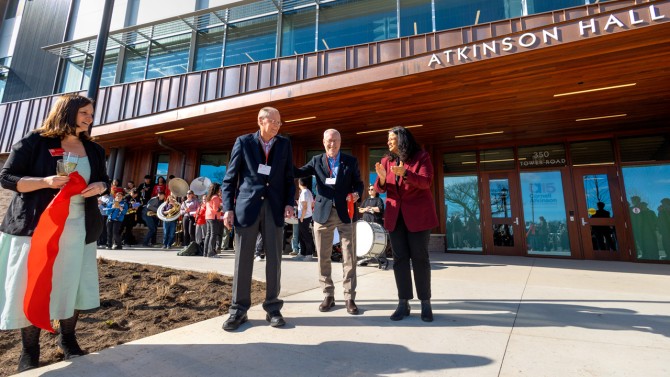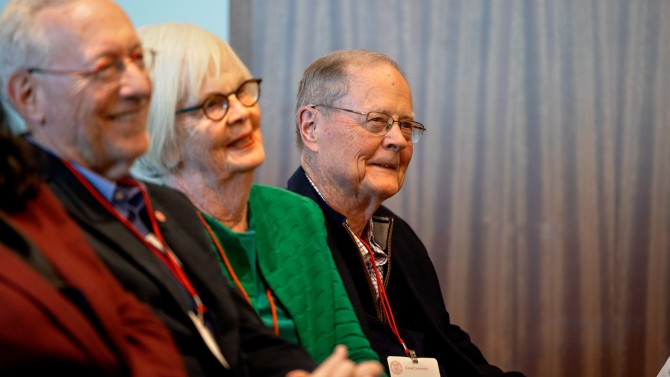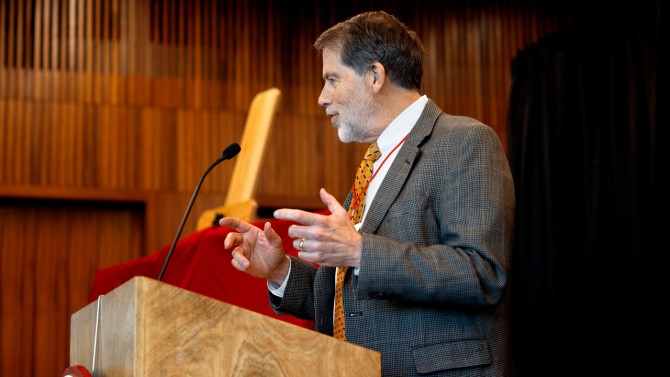Atkinson Hall officially opened its doors with a ribbon-cutting ceremony April 9, realizing its benefactors' vision of the facility as a home for impact-driven research across grand challenges in sustainability, cancer biology and immunology, nutrition, global health and computational biology.
Located at 350 Tower Road, the new research building - the first on Cornell's campus that is not affiliated with a single college - will be an epicenter for radical collaboration, expanding the university's ability to catalyze research and advance solutions to urgent global needs.
The vision of Atkinson Hall was made possible thanks to a landmark gift of $30 million from David R. Atkinson '60 and Patricia Atkinson, who sought to support a multidisciplinary hub where researchers, students and global partners could work toward groundbreaking discoveries.
David R. Atkinson '60, President Michael I. Kotlikoff and Provost Kavita Bala at the ribbon cutting to open Atkinson Hall on April 9.
"This investment is the physical embodiment of the Atkinson family's long-term commitment to research that makes a tangible difference in the well-being of people and the planet," David Lodge, the Francis J. DiSalvo Director of the Cornell Atkinson Center for Sustainability, said in remarks at the dedication event.
President Michael I. Kotlikoff said the Atkinsons and their family "deeply understand the power of research to improve lives through discovery, interventions, collaborative partnerships and the economic benefits of innovation."
President Michael I. Kotlikoff, Patricia Atkinson and David Atkinson '60 listen to remarks during the Atkinson Hall dedication ceremony.
Atkinson Hall hosts offices and labs for several research units: Cornell Atkinson; the Master of Public Health program; the Department of Computational Biology; and will be the home for the Cornell Center for Cancer Immunology, which will bring research strengths in cancer biology, immunology and the impact of nutrition on immune health and cancer development and treatment.
"For Cornell Atkinson, this beautiful new building is allowing us to live into our mission as the hub of sustainability research on campus - not just a virtual hub, but a physical hub, as well," Lodge said. The design will spark "creative collisions" among people and ideas across Cornell's disciplines and research programs, and across its campuses in Ithaca and New York City, Lodge said.
"Dave and Pat's tremendous generosity helps our community to pursue the innovation, the discovery and the creativity that is necessary to solve the issues we face across the globe by enabling collaborations across all disciplines," Provost Kavita Bala said. "Their ongoing support allows Cornell scientists to propel their science into the world, and furthers our mission to enhance the lives and livelihoods of those in our communities and around the globe."
David Lodge, the Francis J. DiSalvo Director of the Cornell Atkinson Center for Sustainability, speaks at the dedication event.
The Atkinsons are among Cornell's most generous and involved benefactors. Their contributions have made a significant impact on the university's research related to agriculture, food systems, energy, health and other areas - and have contributed greatly toward sustainability efforts with local, national and global impact. Their support includes a historic gift of more than $80 million that established Cornell Atkinson, which is celebrating its 15-year anniversary this year.
"While Cornell Atkinson has far exceeded our expectations, perhaps the greatest benefit of having been involved with the center has been the opportunity to meet and get to know so many great Cornell faculty and employees," David Atkinson said. "It is very gratifying to know that their collective work will be enhanced by the presence of Atkinson Hall."
As a reflection of the university's commitment to sustainability, Atkinson Hall includes numerous energy-saving features - from rooftop solar panels and thermal regulation around the building's exterior to a cascading air system that is designed to cut energy use by 26.4%, compared to similar buildings. The building was designed by Lake Flato Architects in collaboration with SWBR.
In addition to the Atkinsons' lead support, philanthropic gifts for offices and meeting spaces in the building have been provided by Erica Chan '91, as well as David Drinkwater '94, who also endowed the David Drinkwater Faculty Directorship at Cornell Atkinson, a position held by Daryl Nydam, professor of population medicine and diagnostic sciences in the College of Veterinary Medicine.
"Atkinson Hall will allow Cornell to do what it does best - bring together faculty from across disciplines to achieve the next level of investigation and discovery," said Gary Koretzky, interim vice provost for research. "This will be transformative for the fields of immunology, cancer biology, molecular biology and genetics, computational biology and biomedical engineering. I can only imagine what discoveries we are going to see as the science in this building develops."
Kelly Merchan is the communications manager for societal systems in Cornell Research and Innovation.









